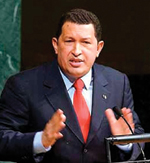|
Vol. 225 No. 10 |

|
 |
| MAYRA RODRIGUES VALLADARES, CONTRIBUTING EDITOR, SOUTH AMERICA |
Chávez won the referendum, so perhaps PDVSA will focus on oil production and not politics. International observers may have affirmed President Hugo Chávez's win on Aug. 15, but the opposition is likely to continue challenging the results. Another key day will be Oct. 31, when regional elections take place, and the opposition may challenge Chávez again.
 |
Venezuelan President Hugo Chávez.
|
|
The opposition, a loose coalition of political parties, business and labor leaders, and civic groups, has struggled to present a united front after the referendum defeat. They are split over whether to challenge Chávez on Oct. 31. Unless the opposition finds a way to challenge him successfully, Chávez will stay in power until December 2006.
Importantly, Chávez's core support comes from unionized oil. The energy sector also includes many private companies that subcontract to the government. These workers and subcontractors supported Chávez, because they know that he will not lower their salaries. Also, when inflation is an issue, he raises their salaries. Many indigent people have supported Chávez, because he has subsidized basic utilities.
Record-high oil prices helped Chávez increase social spending among the poor right before the elections. Moreover, he also benefited from turmoil over the US-Iraq policy that he attacked strongly. Importantly, despite previous weak performance under Chávez, key indicators indicate the economy could grow 10% this year, up from 2003's weak levels.
Under Chávez, Venezuela has pushed for higher oil prices within OPEC, and (this year) PDVSA has reaped the benefits. Estimates from the National Economic Council and the Central Bank indicated that the company's gross revenues could increase about 50%, to a level between $30 billion and $32 billion.
While officials and some analysts disagree about whether PDVSA is producing 3.0 million or 2.6 million bopd, the country's output is more than last year.
Thus far, recent political turmoil has not disrupted the country's energy strategy or PDVSA's production. PDVSA President Ali Rodríguez, who is close to Chávez, believes that with the referendum gone, oil workers will be able to “work without the constant pressure of these (political) campaigns.” To increase output, PDVSA plans to invest $37 billion in the next five years for production, exploration and refinery activities. Rodríguez hopes that foreign oil companies will also invest in Venezuela. Political issues have not kept away foreign investors.
Both Japan and China have looked at opportunities to invest in Venezuela. China's Deputy Minister of Lands and Natural Resources, Lu Xinshe, stated that his government is ready to give PDVSA the “necessary conditions” to work in the Chinese energy sector, so that both countries benefit. Reportedly, China is also researching whether it should import oil from Venezuela.
Also in early September, the Japan Bank for International Cooperation (JBIV) announced that it had renewed a financial cooperation agreement to study the financing of several projects with PDVSA that total $3 billion.
In Bolivia, there may be significant implications for international investors. This is especially true for YPF-Repsol and BP. President Carlos Mesa sent Congress a 14-part hydrocarbon bill that included proposals to nationalize all hydrocarbon resources, create a new energy regulator and increase royalties. Yet, the National Hydrocarbons Chamber (CBH) rejected Mesa's bill, especially because the private sector lobbied against it.
The fact that the bill was rejected could be viewed very positively by international investors. For example, China's Shengli International, a Sinopec subsidiary, said that it wants to invest $1.5 billion in Bolivia's energy sector.
Northern Ecuador tender. Despite several delays, the tender of ITT (Ishpingo-Tambochocha-Tiputini) oil fields is now scheduled by the Ministry of Energy for early 2005. According to a study undertaken by France's Beicip Franlab, the fields' proved reserves total more than 600 million bbl.
Ecuadorian officials are planning to hire a company that would work with Beicip Franlab to manage the tender. Petroecuador has stated that it might consider a contract, where Ecuador has a 49% stake, with the remaining 51% held by a private consortium. By this month, Petroecuador expected to see legislation pass that would allow these types of contract models.
A recent meeting between President Lucio Gutiérrez and former President Abdala Bucaram, known as El Loco, the Insane One, may derail Gutiérrez' energy reform plans. The meeting prompted outrage by the opposition Social Christian Party and the Pachakutik Movement, the political wing of the influential Confederation of Indigenous Nationalities. Both groups fear that Gutiérrez may drop existing corruption charges against Bucaram. These parties, along with the leftist Democratic Popular Movement, have discussed blocking Gutiérrez's hydrocarbon reform bill, if Bucaram returns from exile without facing treason and corruption charges.
Also of potential concern to investors is the recent appointment of former Energy Minister Carlos Arboleda as director of the Deposit Guarantee Agency. As Minister of Energy, he was criticized for allegedly mishandling oil contracts.
Political issues have influenced such companies as Encana. CEO Gwyn Morgan told investors and energy analysts last month that Encana has been in Ecuador for “four or five years and it's constantly a roller-coaster.” Encana is embroiled in a dispute with Ecuador over $120 million in VAT that the firm wants reimbursed. Encana will take the dispute to international arbitration this month. 
Mayra Rodríguez Valladares is president of MRV Associates Inc. (www.MRVAssociates.com), a New York-based consulting company specializing in energy and management consulting to foreign central banks. She is a regular contributor to this column.
|





